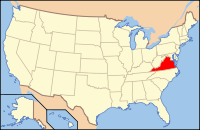Mecklenburg County, VA
| Mecklenburg County, Virginia | ||
|---|---|---|

Mecklenburg County Courthouse
|
||
|
||
 Location in the U.S. state of Virginia |
||
 Virginia's location in the U.S. |
||
| Founded | 1765 | |
| Named for | Charlotte of Mecklenburg-Strelitz | |
| Seat | Boydton | |
| Largest town | South Hill | |
| Area | ||
| • Total | 679 sq mi (1,759 km2) | |
| • Land | 625 sq mi (1,619 km2) | |
| • Water | 54 sq mi (140 km2), 7.9% | |
| Population (est.) | ||
| • (2015) | 31,081 | |
| • Density | 46/sq mi (18/km²) | |
| Congressional district | 5th | |
| Time zone | Eastern: UTC-5/-4 | |
| Website | www |
|
Mecklenburg County is a county located in the Commonwealth of Virginia. As of the 2010 census, the population was 50,727. Its county seat is Boydton.
Mecklenburg County was organized on March 1, 1765, having split from Lunenburg County in 1764 as the result of the passage of an act by the Virginia General Assembly. Due to new settlement and population increases in the area, the legislature divided Lunenburg into three counties: Lunenburg, Charlotte, and Mecklenburg. It was named after Queen Charlotte of Mecklenburg-Strelitz.
The first county government consisted of 13 members; Robert Munford, Richard Witton, John Speed, Henry Delony, Edmund Taylor, Benjamin Baird, John Camp, Thomas Erskine, John Potter, John Cox, Thomas Anderson, John Speed, Jr., and Samuel Hopkins; with Benjamin Baird acting as the first mayor.
Mecklenburg County is governed by a 9-member Board of Supervisors, each elected from a single-member district. They serve as the legislating and policy body for the county enacting laws, ordinances, and taxes. They appoint a County Administrator to conduct day-to-day operations. H. Wayne Carter, III is the current County Administrator, Judy P. Sheffield is the current Assistant County Administrator.
The board members are:
Under the Virginia Constitution, each county and city within the state must install Constitutional Officers. Counties under the Traditional Form of Government must install all five officers. The majority of Virginia counties operate under the Traditional Form. Counties with the County Executive Form, Urban County Executive, or County Manager Plan of Government usually install just three (Clerk, Commonwealth Attorney, and Sheriff) opting for a Director of Finance appointed by the Board to take the place of the Commissioner of Revenue and Treasurer. Examples are (Fairfax, Henrico and Prince William Counties). These officers are heads of their respective departments. They consist of:
...
Wikipedia

